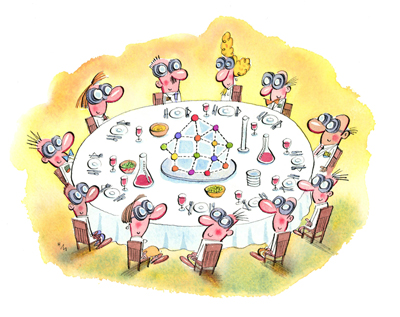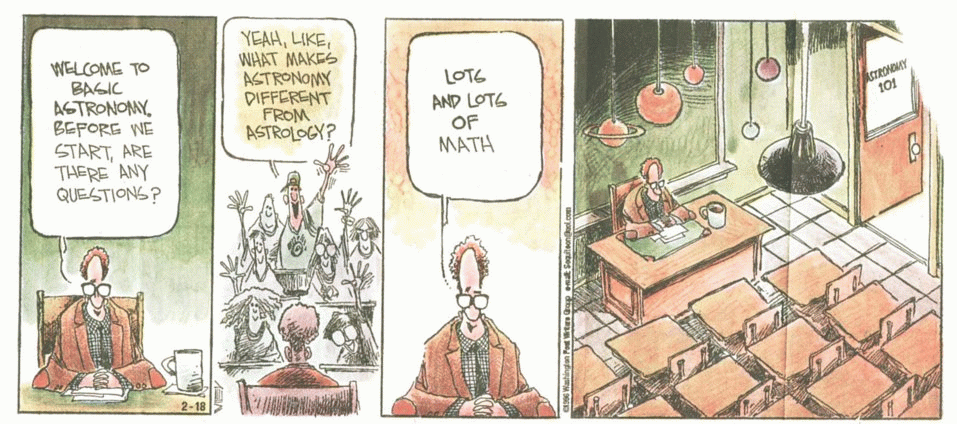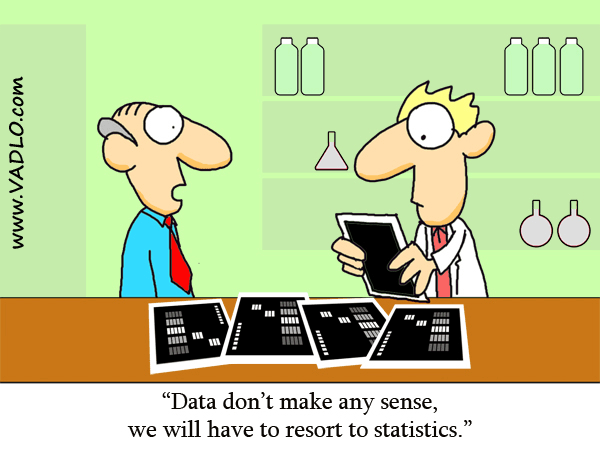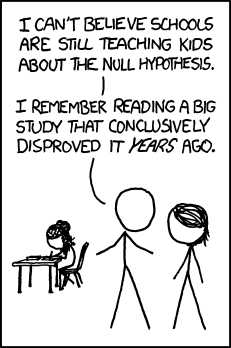A few months ago, Science published a Thanksgiving article on what scientists can be grateful for. It’s got a lot of good points, like being thankful for family members who accept the crazy hours we work, or for those really useful research projects that make science cool enough for us to get funding for the merely really interesting. It does have one unfortunate reference to humanists:
We are thankful that Ph.D. programs in the sciences, as much as we complain about them, aren’t nearly as horrifying as, say, Ph.D. programs in the humanities. I just heard today from a friend in his ninth year of a comparative literature Ph.D. who thinks he might finish “in a year and a half.” At least the job market for comp lit Ph.D. awardees is thriving, right?
Ouch. I suppose the truth hurts. The particularly interesting point that inspired this post, however, was:
We are thankful for that one colleague who knows statistics. There’s always one.
The State of Things
The above quote about statisticians is so true it hurts, as (we just discovered) the truth is wont to do. It’s even more true in the humanities than it is in the more natural and quantitative sciences. When we talk about a colleague who knows statistics, we generally don’t mean someone down the hall; usually, we mean that one statistician who we met in the pub that one night and has a bizarre interest in the humanities. That’s not to say humanist statisticians don’t exist, but I doubt you’re likely to find one in any given humanities department.
This unfortunately is not only true of statistics, but also of GIS, network science, computer science, textual analysis, and many other disciplines we digital humanists love to borrow from. Thankfully, the NEH ODH’s Institutes for Advanced Topics in the Humanities, UVic’s Digital Humanities Summer Institutes, and other programs out there are improving our collective expertise, but a quick look for GIS/Stats/SNA/etc. courses in most humanities departments still produces slim pickings.
One of the best things to come out of the #hacker movement in the Digital Humanities has been the spirit to get our collective hands dirty and learn the techniques ourselves. It’s been a long time coming, and happier days are sure to follow, but one skill still seems underrepresented from the DH purview: statistics.
Why Statistics? Why Bayesian Statistics?
In a recent post by Elijah Meeks, he called Text Analysis, Spatial Analysis, and Network Analysis the “three pillars” of DH research, with a sneaking suspicion that Image Analysis should fit somewhere in there as well. This seems to be the converging sentiment in most DH circles, and although when asked most would say statistics is also important, it still doesn’t seem to be among the first subjects named.
With another round of Digging Into Data winners chosen, and a bevy of panels and presentations dedicating themselves to Big Data in the Humanities, the first direction we should point is statistics. Statistics is a tool uniquely built for understanding lots of data, and it was developed with full knowledge that the data may be incomplete, biased, or otherwise imperfect, and has legitimate work-arounds for most such occasions. Of course, all the caveats in my first Networks Demystified post apply here: don’t use it without fully understanding it, and changing it where necessary.
Many Humanists, even digital ones, frequently seem to have a (justifiably) knee-jerk reaction to statistics. If you’ve been following the Twitter and blog conversations about AHA 2012, you probably caught a flurry of discussion over Google Ngrams. Conversation tended toward horrified screams of the dangers of correlation vs. causation (or at least references to xkcd), and the ease with which one might lie via statistics or omission. These are all valid cautions, especially where ngrams is concerned, but I sometimes fear we get so caught up in bad examples that we spend more time apologizing for them than fixing them. Ted Underwood has a great post about just this, which I will touch on again shortly. (And, to Ted and Allen specifically, I’m guessing you both will enjoy this post.)
In short: statistics is useful. To quote the above-linked xkcd comic:
Correlation doesn’t imply causation, but it does waggle its eyebrows suggestively and gesture furtively while mouthing ‘look over there’.
So how do we go about using statistics? In a comment on Ted’s recent post about statistics, Trevor Owens wrote:
if you just start signing up for statistics courses you are going to end up getting a rundown on using t-tests and ANOVAs as tools for hypothesis testing. The entire hypothesis testing idea remains a core part of how a lot of folks in the social sciences think about things and it is deeply at odds with what humanists want to do.
The key is not appropriation but adaption. We must learn statistics, even the hypothesis testing, so that we might find what methods are useful, what might be changed, and how we can get it to work for us. We’re humanists. We’re really good at methodological critique.
One of the areas of statistics most likely to bear fruit for humanists is Bayesian statistics. Some of us already use it in our text mining algorithms, although the math involved remains occult to most. It basically builds uncertainty and belief directly into statistics. Instead of coming up with one correct answer, Bayesian analysis often yields a range of more or less probable answers depending what seems to be the case from prior evidence, and can update and improve that range as more is learned.
For humanists, this importance is (at least) two-fold. Ted Underwood sums up the first reason nicely:
[Bayesian inference] is amazingly, almost bizarrely willing to incorporate subjective belief into its definition of knowledge. It insists that definitions of probability have to depend not only on observed evidence, but on the “prior probabilities” that we expected before we saw the evidence. If humanists were more familiar with Bayesian statistics, I think it would blow a lot of minds.
The second and more specific reason worth mentioning here deals with the ranges I discussed above. If a historian, for example, is trying to understand how and why some historical event happened, Bayesian analysis could yield which set of occurrences were more or less likely, and which were so far off as to not be worth considering. By trying to find reasonable boundary conditions rather than exact explanations to answer our questions, humanists can retain that core knowledge that humans and human situations are not wholly deterministic machines, who all act the same and reproduce the same results in every situation.
We are intrinsically and inextricably inexact, and until we get computers that see and remember everything, and model it all perfectly, we should avoid looking for exact answers. Bayesian statistics, instead, can help us find a range of reasonable answers, with full awareness and use of the beliefs and evidence we have going in.
A Call to Arms
After I read that post about a scientist’s thanksgiving, I realized I didn’t want to have to rely on that one colleague who knows statistics. Nobody should. That’s why I decided to enroll in a Bayesian Data Analysis course this semester, taught by and using the book of John K. Kruschke. It’s a very readable book, directed toward people with no prior knowledge in statistics or programming, and takes you through the basics of both. Kruschke’s got a blog worth reading, as does Andrew Gelman, an author of the book Bayesian Data Analysis. I’m sure a basic Google search can point you to video lectures, if that’s your thing. I’ll also try to blog about it over the coming months as I learn more.
There are several (occasionally apocryphal) anecdotes about the great theoretical physicists of the early 20th century needing to go back to school to learn basic statistics. Some still weren’t terribly happy about it (“God does not play dice with the universe”), but in the end, pressures from the changing nature of their theories required a thorough understanding of statistics. As humanists begin to deal with a glut of information we never before had access to, it’s time we adapt in a similar fashion.
The wide angle, the distant reading, the longue durée will all benefit from a deeper understanding of statistics. That knowledge, in tandem with traditional close reading skills, will surely become one of the pillars of humanities research as Big Data becomes ever-more common.




You might be interested in Aviezer Tucker’s book Our Knowledge of the Past, which argues that historiographical practice is best understood from a Bayesian perspective.
This is fantastic, thank you! I will definitely take a look at it.
You’re right that I enjoyed the post! Also, Kruschke’s book looks a lot more accessible than the one I got out of our library. I’ve convinced myself that I mostly “understand” that one, but I might just read Kruschke’s to make sure that I actually do!
Great post. Thanks Scott.
Here’s my favorite quote on the subject:
Also worth mentioning might be a recent book from Yale UP that is addressed to a general audience: The Theory That Would Not Die by Sharon Mcgrayne https://www.powells.com/biblio/62-9780300169690-0
I agree that the publication of Kruschke’s book probably going to be a watershed moment in making Bayesian statistics widely accessible. I’d also recommend Simon Jackman’s ‘Bayesian Analysis for the Social Sciences’ (2009) and his class notes here: http://jackman.stanford.edu/classes/BASS. Another decent one is Ntzoufras’ ‘Bayesian Modeling Using WinBUGS: An introduction’ (2009) http://stat-athens.aueb.gr/~jbn/winbugs_book
Thanks, Ben, those look like fantastic resources. It’s worth pointing out that both Jackman and Kruschke suggest using JAGS over BUGS for markov chains.